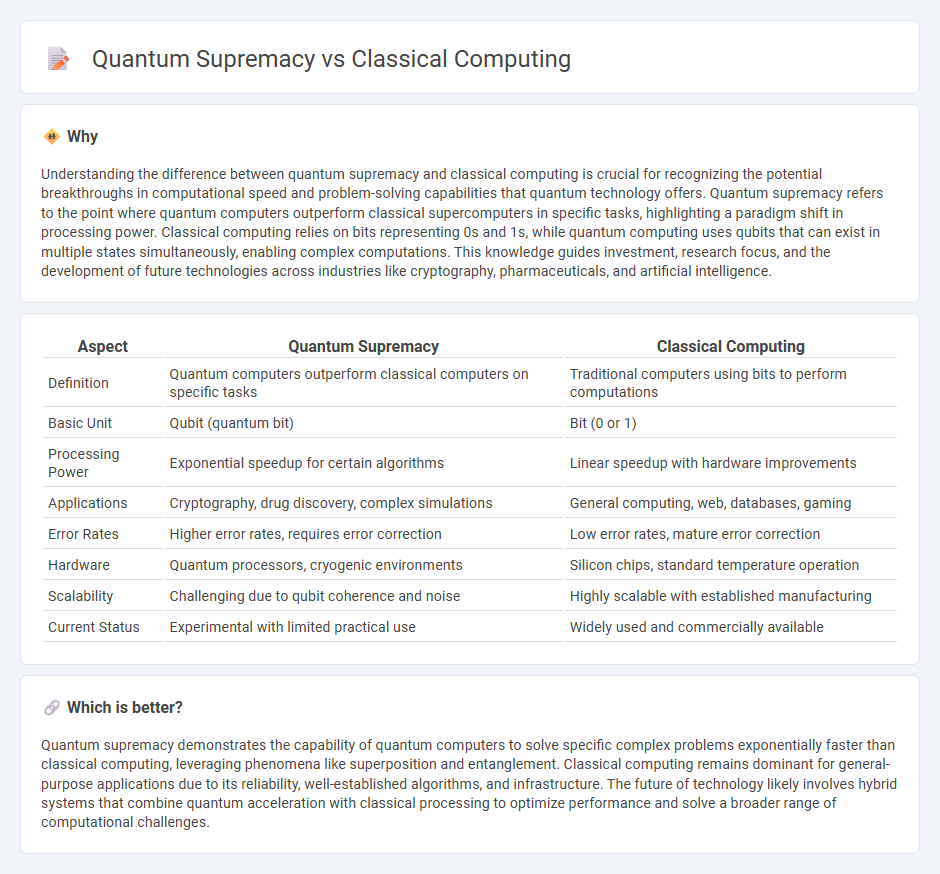
Quantum supremacy represents a paradigm shift by leveraging quantum bits (qubits) that perform complex calculations exponentially faster than classical bits in traditional computers. Classical computing relies on binary processing and deterministic algorithms, limiting its efficiency in solving intricate problems like large-scale factorization or optimization tasks. Explore the groundbreaking differences and implications of quantum supremacy compared to classical computing to understand the future of computational technology.
Why it is important
Understanding the difference between quantum supremacy and classical computing is crucial for recognizing the potential breakthroughs in computational speed and problem-solving capabilities that quantum technology offers. Quantum supremacy refers to the point where quantum computers outperform classical supercomputers in specific tasks, highlighting a paradigm shift in processing power. Classical computing relies on bits representing 0s and 1s, while quantum computing uses qubits that can exist in multiple states simultaneously, enabling complex computations. This knowledge guides investment, research focus, and the development of future technologies across industries like cryptography, pharmaceuticals, and artificial intelligence.
Comparison Table
| Aspect | Quantum Supremacy | Classical Computing |
|---|---|---|
| Definition | Quantum computers outperform classical computers on specific tasks | Traditional computers using bits to perform computations |
| Basic Unit | Qubit (quantum bit) | Bit (0 or 1) |
| Processing Power | Exponential speedup for certain algorithms | Linear speedup with hardware improvements |
| Applications | Cryptography, drug discovery, complex simulations | General computing, web, databases, gaming |
| Error Rates | Higher error rates, requires error correction | Low error rates, mature error correction |
| Hardware | Quantum processors, cryogenic environments | Silicon chips, standard temperature operation |
| Scalability | Challenging due to qubit coherence and noise | Highly scalable with established manufacturing |
| Current Status | Experimental with limited practical use | Widely used and commercially available |
Which is better?
Quantum supremacy demonstrates the capability of quantum computers to solve specific complex problems exponentially faster than classical computing, leveraging phenomena like superposition and entanglement. Classical computing remains dominant for general-purpose applications due to its reliability, well-established algorithms, and infrastructure. The future of technology likely involves hybrid systems that combine quantum acceleration with classical processing to optimize performance and solve a broader range of computational challenges.
Connection
Quantum supremacy marks the point where quantum computers solve problems beyond classical computing capabilities, highlighting their complementary roles in computational advancements. Classical computing remains essential for routine tasks and algorithm development, while quantum systems excel at complex simulations and cryptographic challenges. Integrating both technologies drives innovation, optimizing problem-solving across diverse scientific and industrial applications.
Key Terms
Source and External Links
Classical Computing - This traditional computing approach uses binary bits that are either 0 or 1 to store and process information.
Quantum Computing vs Classical Computing - This comparison highlights the differences between classical computing, which performs a maximum of N calculations simultaneously, and quantum computing, which can perform up to 2^N calculations.
Classical and Quantum Computing Differences - This article explains how classical computing uses binary bits and transistor logic, contrasting with quantum computing's use of qubits and quantum physics principles.
 dowidth.com
dowidth.com